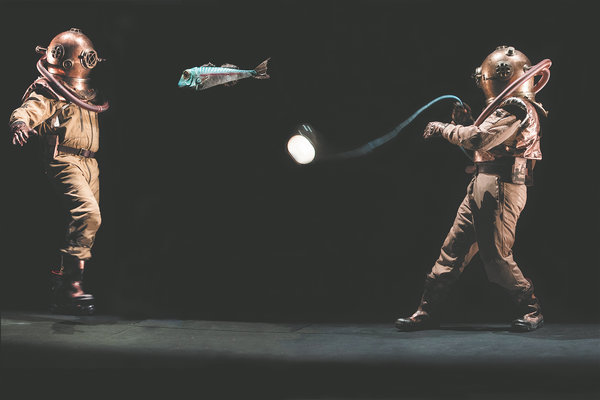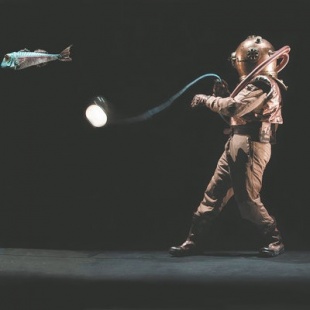Classic submarine novel stirs wave of anticipation
Chinese artists present stage version of Twenty Thousand Leagues Under the Sea, Cheng Yuezhu reports.


One of the classic French books that Chinese readers are likely to have encountered during their childhood is the sci-fi novel Twenty Thousand Leagues Under the Sea by literary giant Jules Verne.
Joining natural scientist Pierre Aronnax, his servant Conseil, and harpooner Ned Land, the readers go on adventures aboard Captain Nemo's submarine Nautilus, exploring the underwater forests, navigating the Antarctic ice fields and battling a giant squid.
Over the 150 years since its publication, the book has been made into countless adaptations, including films, comics and stage plays. As 2024 marks the 60th anniversary of diplomatic relations between China and France, the Central Academy of Drama and the Hong Kong Arts Festival invited artists from both China and France to coproduce a stage rendition of the novel.
At the production's launch ceremony hosted at the Central Academy of Drama in Beijing on Dec 17, it was announced that the new production is a commissioned program for the 53rd Hong Kong Arts Festival in 2025 and a project within the 2025 Festival Croisements, an annual series of cultural exchange events between China and France.

The production is adapted and directed by Christian Hecq, director and actor from leading French theater company the Comedie-Francaise, and Valerie Lesort, a visual artist, actress and director.
The two first adapted the novel for stage in 2015, extensively adopting puppetry that brings to life onstage the variety of underwater creatures.
In that production, with only six onstage performers and one voice-over artist, each of the onstage performers also served as a puppeteer. By wearing black bodysuits and manipulating the puppets in a black box theater setting, they allowed the creatures to appear to be swimming in water and expressing a range of emotions through their movements.
At the launch ceremony, Hecq brought a hand puppet in the shape of a small squid, and demonstrated how it is operated. Both he and Lesort prefer traditional theater techniques, which seek to create varied stage effects with the actors' physical expressions, rather than multimedia technology, he explains.
This new edition will retain the directors' core vision, joined by Chinese artists to present a more localized rendition. The Chinese crew members include director Zha Wenyuan, director, playwright and actor Tian Xiaowei as the dramaturge, and Chinese performers, such as TV and film actor Bao Jianfeng, who is performing in theater for the first time in 10 years.
"China is like a new world for me, and I can't wait to start creating with Chinese actors. Our stage adaptation will be a work that transcends borders," Hecq said at the launch ceremony.
"The characters in the play will be more richly developed, and the marine creatures will be given unique personalities, becoming an integral part of the story. I believe Chinese audiences will love this unique underwater adventure."
Zha says that some of the key highlights in localizing the classic tale aim to bring a fresh sense of theatrical fantasy to the Chinese audiences, while making the story easily relatable.
"It has been performed in France for many years, where it has been highly acclaimed as a mature and exceptional production. Bringing it to China, with Chinese actors performing it for Chinese audiences, we hope to create a stage ambience and performance style that reflect Chinese sensibilities," she says.
"We also hope that Chinese audiences can connect with the story to the fullest extent."
The production crew has already been making adjustments to the script, led by Tian. The goal is to ensure that the dialogue aligns with Chinese language habits and cultural context, and to preserve and convey the humor in the original text.
Zha says that one of the adjustments she is impressed by is a song featured in the eighth act. In the scene, the characters have spent over half a year in the submarine, leading them to miss the life on land and reminisce about the past. The harpooner Land starts to sing a sailor's song, soon joined by two other characters.
"In the original French version, the lyrics are straightforward, expressing the yearning to, for example, find a beloved girl, take down the whale and set sail. These lines exude a strong sense of ambition and drive, embodying the spirit of sailors rooted in maritime culture," she says.
"The adapted lyrics carry a Chinese essence, not just because they resemble classical Chinese poetry in the sentence structure, rhyme and rhythm, but more importantly, because they convey a uniquely Chinese sentiment, a sense of homesickness and solitude. It's like a song that people can actually sing together when they're missing home."
It was announced at the ceremony that the production will soon begin its creation and rehearsal at the academy's campus in Changping district, and is set to premiere on March 20 at the 53rd Hong Kong Arts Festival. Afterward, it will begin a nationwide tour, including in the Guangdong-Hong Kong-Macao Greater Bay Area, Shanghai, Chengdu in Sichuan province, Xi'an in Shaanxi province and Beijing.
According to Hao Rong, president of the Central Academy of Drama, the academy has established a strategic partnership with the Hong Kong Arts Festival, aiming to together promote performing arts development and innovation via in-depth collaboration and exchange in theater education, creation and research.
"Based on the strategic collaboration, this production serves as an important initiative and in-depth practice in building the theoretical framework of Chinese theater, and in exploring the integration of production, education and research," Hao says.
"It is also a significant achievement of the academy in promoting cultural exchange and mutual learning, as well as enhancing the international impact of Chinese culture."





































